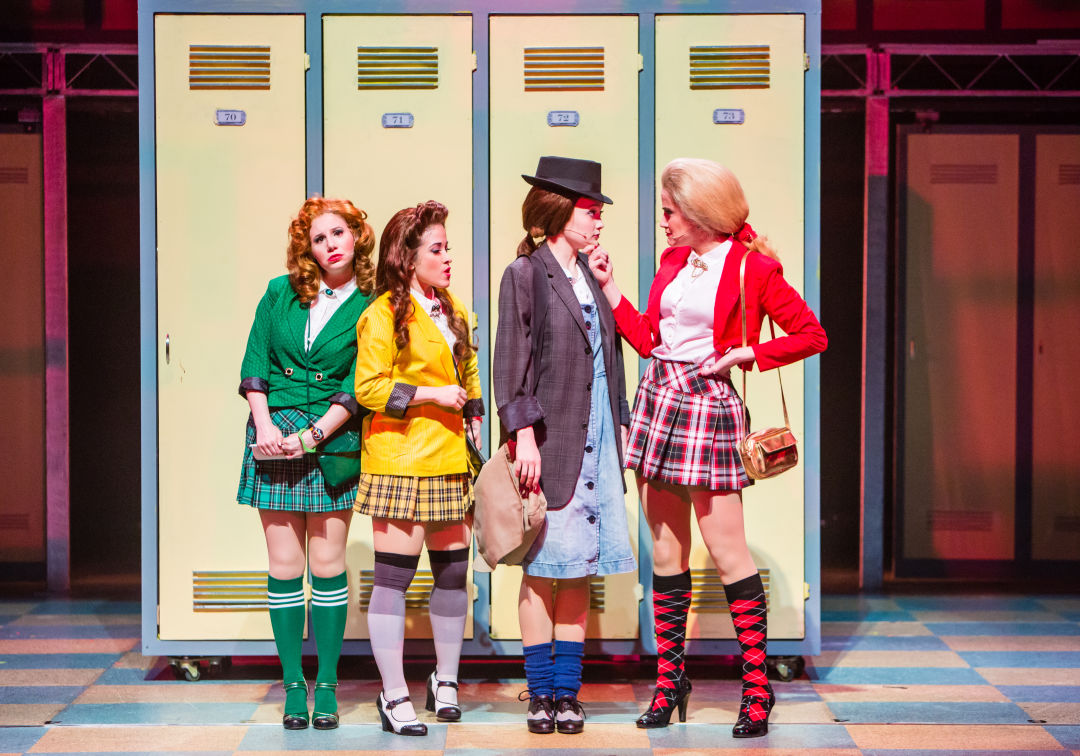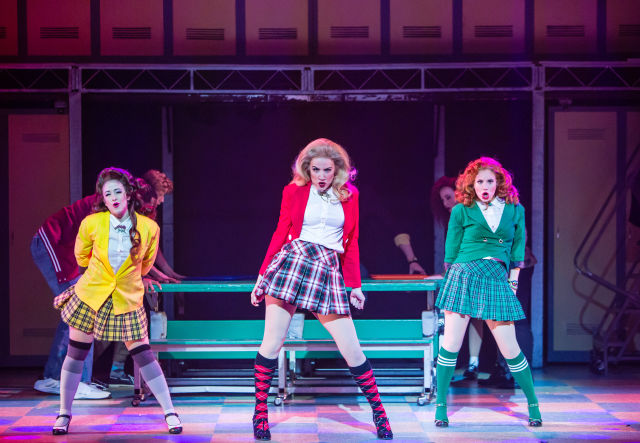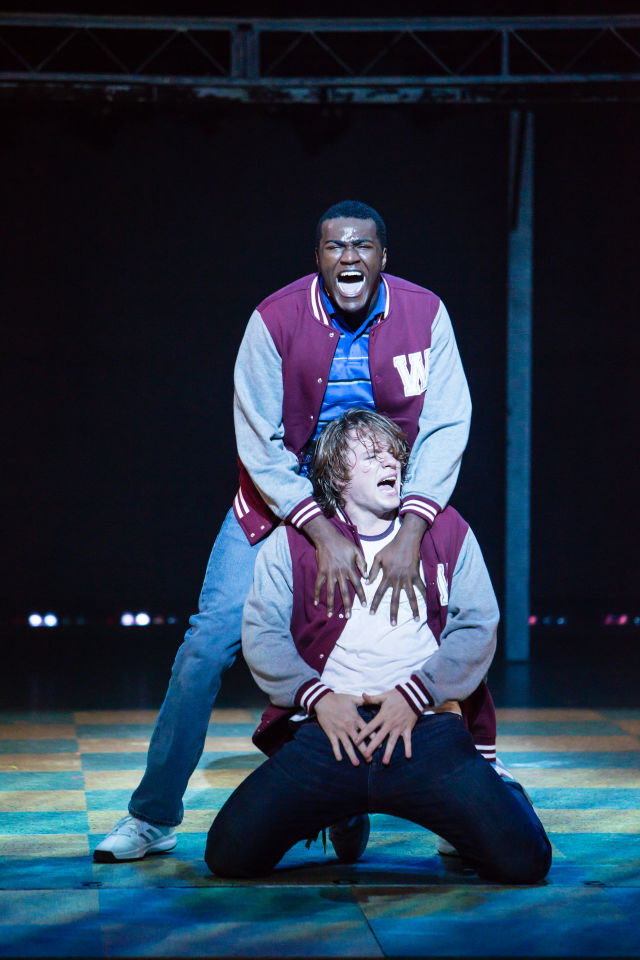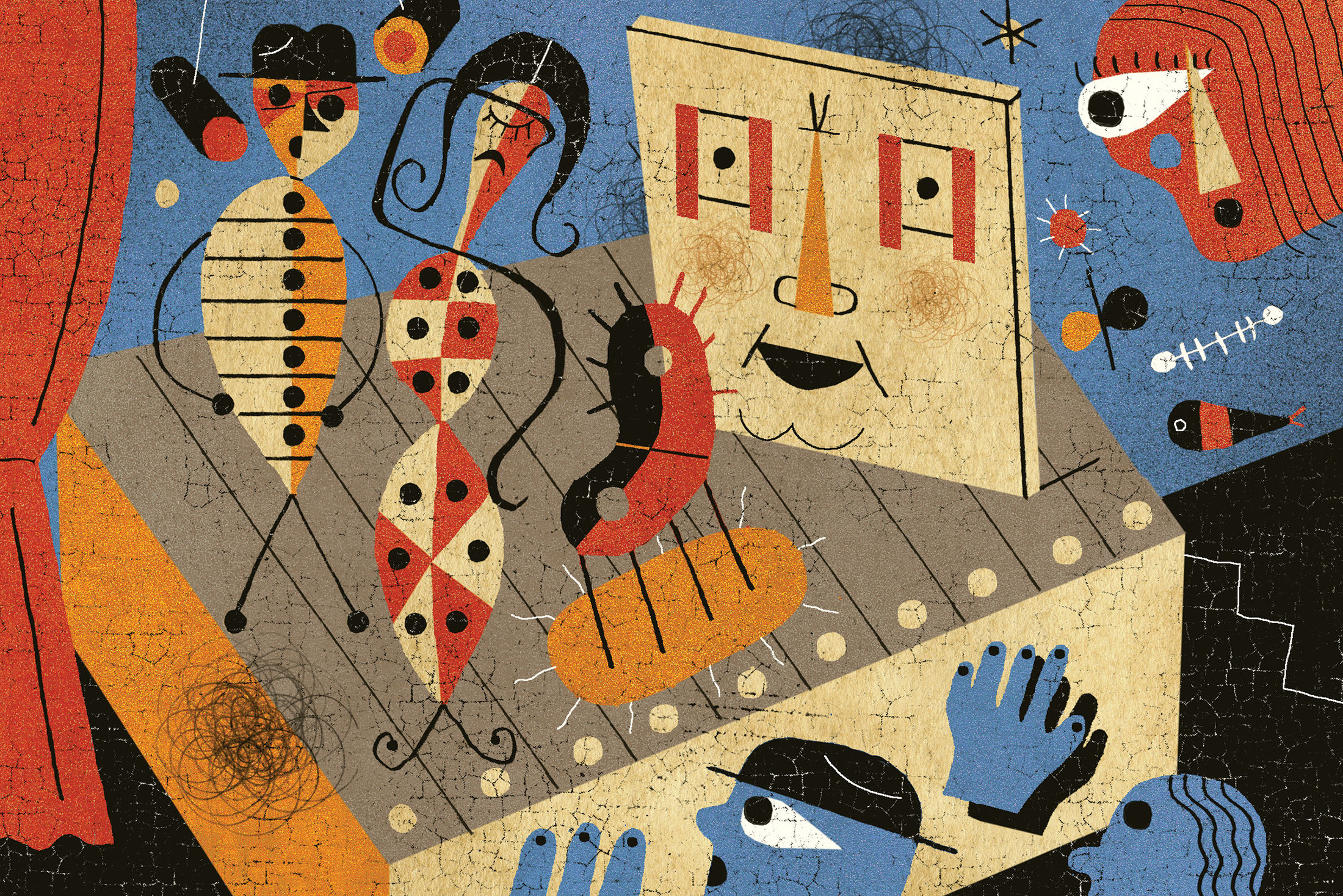The Lip Gloss Gestapo: TUTS Underground Brings Heathers to Houston

From left: Chelsea Stavis as Heather Duke, Natalie Coca as Heather McNamara, McKenna Marmolejo as Veronica, and Kathryn Porterfield as Heather Chandler in TUTS Underground's latest production, Heathers.
Image: Christian Brown
The 1989 cult classic Heathers may have starred box office favorites Winona Ryder and Christian Slater while making cinematic waves as the darkest comedy in the land, but the film was never a big moneymaker. Instead, it gained a loyal following over the years and set a new standard for bleak-and-black comedic send-ups of the hellish social Darwinism of the American public high school.
Shocking in its cynicism and profanity, even actress Shannen Doherty, who played one of the triumvirate of “Heathers” that ruled the fictional Westerburg High School in suburban Ohio, said the language was often too much for her, and that she “blushed” when reading many of her lines. The movie shook things up, satirizing the cruel social hierarchy dominating high school life, while the use of dark humor was a reminder that high school is mostly something to be endured—nothing can be done to rid the school of the Heathers, the original (and far meaner) Mean Girls, save extreme violence.
Today, composers Laurence O’Keefe and Kevin Murphy have transformed Daniel Waters’ original film into a lively, updated musical that offers necessary glimmers of optimism in an otherwise bleak, cruel world. Musical theater in general does not lean towards the tragic Sweeney Todd trajectory, after all, and not every dark number can be as smashingly successful as, say, “Cell Block Tango (He Had It Comin’)” in a show like Chicago. Still, we are a long way from Olivia Newton-John and John Travolta’s high school romance in Grease; this is not your grandparents’ high school musical.
Dominating the show are McKenna Marmolejo as Veronica Sawyer, the newest inductee into Heatherism, and Kathryn Porterfield as the Alpha Heather, Heather Chandler. Marmolejo’s singing and acting are pitch perfect for the role, and her performance holds the entire production together, even when it is interrupted with overly long (and often excessively crude and repetitive) musical numbers from the ensemble. Porterfield, who just finished a strong lead performance in TUTS Underground’s recent original production of The Sweet Potato Queens, defines the Alpha Heather completely as “a mythic bitch.” From cruel sneers to manipulative schemes, Porterfield is all haughty mannerisms and envy-worthy vocals that never disappoint, with all eyes on her when she takes the stage, red scrunchy or not. Both actresses’ performances are helped by their excellent comedic timing, which is tricky business to deliver with such dark humor.

From left: Natalie Coca as Heather McNamara, Kathryn Porterfield as Heather Chandler, Chelsea Stavis as Heather Duke and McKenna Marmolejo as Veronica.
Image: Christian Brown
Also notable is Mason Butler as Jason “J.D.” Dean, whose casual attitude towards killing his classmates defines the gallows humor that permeates the show. He successfully moves from a loner who has our sympathy (as he sings “Freeze Your Brain,” he tells us that “happiness comes when everything is numb”) to a cold-blooded murderer who still has enough of a cute quotient to keep Veronica’s attention. Butler’s notable singing moves from sincere to sicko seamlessly, and his transmogrification into the darkest of villains is subtle but convincing.
By definition, “black comedy” makes light of taboo, serious, or disturbing subjects—and maybe we need a trigger warning for audiences who are not ready for teen suicide, teen murder, teen bulimia, teen drug use, and teen promiscuity to be the objects of our ridicule and the recipients of our laughter. This sort of comedy can make some uneasy, as Will Ferrell recently discovered after experiencing backlash in the wake of news that he was set to star as an aging President Ronald Reagan struggling with Alzheimer’s disease (a movie which has now been called off).

Andrew Carson as Ram Sweeney and Thomas Williams as Kurt in Heathers.
Image: Christian Brown
I confess that as the mother of a teen, and someone who went to a big suburban high school in the 1980s, I might be more sensitive to these things than other audience members, many of whom were laughing frequently and obviously found the dark humor to be hilarious. But there is a fine line between “edgy” and falling completely over the cliff, and the sophistication required of black humor is often overshadowed by the blue comedy that seems, on stage, so slap-sticky and crude that at times it’s more gross than grotesque—and, sadly, not funny.
The sets, which open with long rows of high school lockers and evolve into cafeteria scenes, bedrooms and party houses with aplomb, are impressive and complement the costumes and lighting. Director Marley Wisnoski and choreographer Shay Rodgers do wonders with the vertical space of the sets and keep things moving—and I loved the choreographed dance numbers that perfectly infused the cattitudes of the so-called Lip Gloss Gestapo as they rule the types of students that tend to populate many high schools, from geeks to preppies to jocks.
The singing and choreography, including some clever slo-mo scenes and brilliant lunch table dancing by The Heathers, all of whom perform well (although I was worried about them falling off those tables in high heels), is definitely entertaining. One of the highlights was Natalie Coca as Heather McNamara singing the moving “Life Boat”—a great moment of empathic relief in a rather sociopathic show.
Heathers is not for the easily offended or the faint of heart, but it is risky and interesting, and musically speaking, the songs themselves (particularly “Our Love Is God” and “Seventeen”) seem better than the material that originally inspired them, and watching them performed is a treat. This musical has a limited audience of its own design—fans of bleak, black comedy and fans of musical theater don’t often intersect—and I left the theater hoping that the excellent cast, choreography, costumes and sets had a better channel for their energy than the script for Heathers allows. Their talents outstrip the material, and I often wished it was just a pop-opera (only singing and dancing!) rather than an adaptation of a film that trivializes teen angst and suicide in a way that might have been better left to the 1980s than resuscitated now.
In any case, the high stakes of high school popularity never seemed so grim, and the lame attempt of Veronica to reconnect with her former nice best friend, who has been profoundly victimized by both Veronica and the sick social system, seems too little, too late. The comedic twist of the cruelest Heather’s death turning into a sympathy party for someone who was misunderstood (cue the song “The Me Inside of Me”—which no one sees or gets) is ironic, but never in a wistful way. When Veronica sings “Can’t we be seventeen?” in the song “Seventeen,” one can’t but help but wish for that also, but Heathers is so dark, the very thought seems like a stupid impossibility, relegating you to proverbially eating lunch alone for the rest of your life. Ironically enough, Heathers reminds us that such a fate might not be all that bad.




